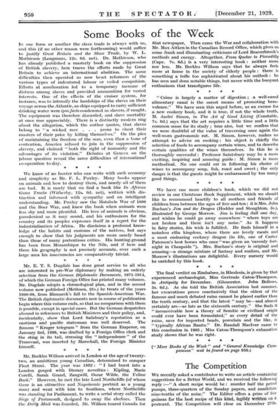Some Books of the Week
IN one form or another the slave trade is always with us, and this (if no other- reason were forthcoming) would suffice to justify Great Britain and the Slave Trade, by W. L. Mathieson (Longmans, 12s. 6d. net). Dr. Mathieson, who has already published a masterly book on the suppression of British slavery, here traces the efforts made by Great Britain to achieve an international abolition. The same difficulties then operated as now beset reformers of the various types of indentured labour or veiled compulsion. Efforts at amelioration led to a temporary increase of distress among slaves and provided ammunition for vested interests. One of the effects of the cruiser system, for instance, was to intensify the hardships of the slaves on their voyage across the Atlantic, as ships equipped to carry sufficient drinking water were ipso facto condemned as slavers, if caught. The equipment was therefore discarded, and slave mortality at once rose appreciably. There is a distinctly modern ring about the allegation, which the author quotes, that slaves belong to " a wicked race . . . prone to cheat their masters of their price by killing themselves." On the plea of maintaining the freedom of the seas, even then a bone of contention, America refused to join in the suppression of slavery, and claimed " both the right of immunity and the advantages of its violation." Debates at Geneva on the labour question reveal the same difficulties of international co-operation to-day. * * *


































 Previous page
Previous page